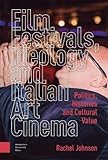Film Festivals, Ideology and Italian Art Cinema : Politics, Histories and Cultural Value / Rachel Johnson.
Material type: TextPublisher: Amsterdam : Amsterdam University Press, [2023]Copyright date: ©2023Description: 1 online resource (308 p.)Content type:
TextPublisher: Amsterdam : Amsterdam University Press, [2023]Copyright date: ©2023Description: 1 online resource (308 p.)Content type: - 9789048554201
- 791.43074 23//eng/20240318eng
- online - DeGruyter
| Item type | Current library | Call number | URL | Status | Notes | Barcode | |
|---|---|---|---|---|---|---|---|
 eBook
eBook
|
Biblioteca "Angelicum" Pont. Univ. S.Tommaso d'Aquino Nuvola online | online - DeGruyter (Browse shelf(Opens below)) | Online access | Not for loan (Accesso limitato) | Accesso per gli utenti autorizzati / Access for authorized users | (dgr)9789048554201 |
Frontmatter -- Table of Contents -- List of Illustrations -- Acknowledgements -- Introduction -- 1. Film Festivals and Ideology Critique -- Section I Artistic Universality -- 2. Enjoy Your Auteurism! The Son’s Room at Cannes -- 3. Gendering Art: The Great Beauty at Cannes and Tallinn -- Section II Political Universality -- 4. There Is No Sexual Relationship: Facing Window at Karlovy Vary -- 5. Brutal Humanism: Fire at Sea at the Berlinale -- Section III Capital -- 6. Capitalism and Orientalism: Gomorrah at Cannes -- Conclusion: Da capo senza fine -- Appendices -- Bibliography -- Filmography -- Index of Films -- Index of Names -- Index of Subjects
restricted access online access with authorization star
http://purl.org/coar/access_right/c_16ec
Film Festivals, Ideology and Italian Art Cinema is the first systematic study of the role ideology plays in film festivals’ construction of dominant ideas about art cinema. Film festivals are considered the driving force of the film industry outside Hollywood, disseminating ideals of cinematic art and humanist politics. However, the question of what drives them remains highly contentious. In a rare consideration of the European competitive film festival circuit as a whole, this book analyses the shared economic, geopolitical and cultural histories that characterise ‘European A festivals’. It offers, too, the first extensive analysis of such festivals’ role in the canonisation of select Italian films, from Rome, Open City to The Great Beauty and Gomorrah. The book proposes a new approach to ideology critique, one that enables detailed examination of how film festivals construct ideas about not only contemporary art cinema, but assumptions about gender, race, colonialism and capitalism.
Mode of access: Internet via World Wide Web.
In English.
Description based on online resource; title from PDF title page (publisher's Web site, viewed 02. Jun 2024)


